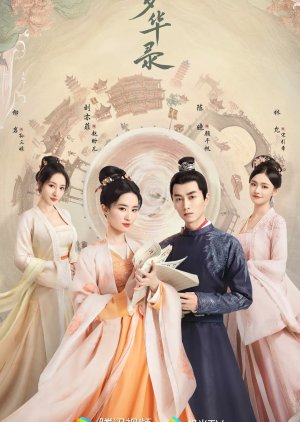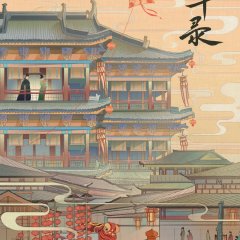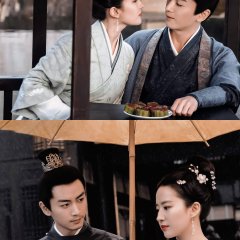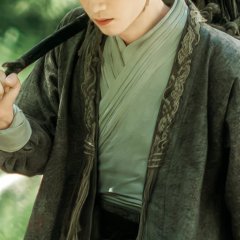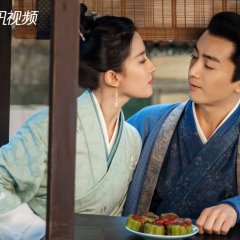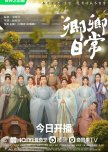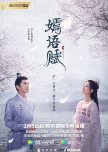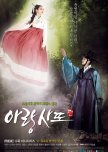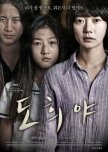 Most Popular Chinese Actresses on MDL Part 1
Most Popular Chinese Actresses on MDL Part 1 Zhao Pan Er se rend à la capitale pour demander des comptes à son fiancé qui l'a lâchement abandonnée mais celui-ci refuse de prendre la responsabilité de ses actes. Une fois là-bas, elle rencontre deux autres femmes qui ont elles aussi été trahies en amour : Song Yin Zhang qui a été trompée et maltraitée par son mari et Sun San Niang qui a même tenté de se suicider à cause de son malheur marital. Toutes les trois vont s'unir dans leurs difficultés et ouvrir ensemble une maison de thé. (Source : Nautiljon) Modifier la traduction
- Français
- Русский
- Español
- English
- Titre original: 梦华录
- Aussi connu sous le nom de:
- Réalisateur: Yang Yang
- Scénariste: Zhang Wei
- Genres: Historique, Romance
Où regarder Bian Liang Meng Hua Tu
Subscription (sub)
Gratuit•e (sub)
Gratuit•e (sub)
Purchase (sub)
Subscription (sub)
Distribution et équipes
- Crystal Liu Rôle principal
- Chen Xiao Rôle principal
- Ada Liu Rôle principal
- Jelly Lin Rôle principal
- Gao Chang Yuan Rôle Secondaire
Critiques

Excellent mix de romance / action / suspense / humour avec un super cast
Un excellent drama historico-romantique, avec du suspens, de l'action, un tas de complots, de l'humour et 3 strong FL.Le charme de Chen Xiao en ML, et son talent font le reste (il arrive même à rendre sympa son personnage de tortionnaire :) :)
Le plot est original : parcours de 3 amies, low-classed, qui vont essayer de s'en sortir dans la capitale, et tentent de monter un commerce. Le point de vue est résolument féminin.
Les hommes sont respectivement : le chef de la sécurité impériale, un officiel ex-fiancé evil, un enseignant bigleux et un important businessman.... et les autres.
Le rythme est assez dynamique, les images sont belles.
Seul bémol : beaucoup de flash-back et trop trop long sur la musique traditionnelle.
A revoir éventuellement pour les OTP (mais pas tout le drama car il comporte quand même 40 épisodes...)
Cet avis était-il utile?

PeachBlossomGoddess
114 personnes ont trouvé cette critique utile
Love is a many splendored thing.
A Dream of Splendor has rocked the staid, tired, cliché infested Chinese period drama world. It is an alluring adult romance that has set the internet on fire. It is a powerful and exhilarating story about downtrodden women who work together to stand up against feudal society. Written and directed by women, it is a story about how women survive, thrive, bond and love. The production values are astonishing, with meticulous attention to detail and appreciation for history and culture.This story is about the plight of fallen women or jian ji 贱籍 during Northern Song Dynasty. Jian ji are pariahs or outcasts; people who exist outside of the four social classes of scholars, farmers, workers and merchants and are practically slaves, beggars, prostitutes, actors, musicians or fallen people below commoner status. This status is passed from generation to generation and cannot be easily changed and the women are not considered suitable for marriage into gentry other than as concubines. Promising beauties like Zhao Pan'er and Song Yinzhang are trained from a young age in the fine arts and performance to potentially become renown entertainers to the imperial court. Too often, like Zhang Haohao they become courtesans who flourish at the most elite levels of society and are almost indistinguishable from upper class women. Many hope to marry their patrons and leave this existence behind them. This explains both Pan'er and Yinzhang's insecurities and their strong desire to shed the taint of the jian ji 贱籍 status.
The drama was mocked for its preoccupation with chastity which does not fit in with the societal norms of the day. In Guan Hanqing's famous original zaju 杂剧 or Yuan opera 赵盼儿风月救风尘 (Zhao Pan'er Flirts to Save A Harlot), both Panér and Yinzhang are courtesans. Guan Hanqing's works are known for championing the oppressed and courtesans were historically viewed sympathetically. The grace, beauty and education of legendary courtesans is often celebrated in Chinese vernacular literature. The production decided however, that Chinese audiences would not be receptive to a Song dynasty version of Pretty Woman. While some may feel this does not respect the original works, it is not important. The drama adaptation in its entirety is far from prudish and remains faithful to the spirit of the play in its criticism of the hypocrisy of traditional morality. That is all that really matters.
After crushing personal setbacks, Zhao Pan'er, Sun Sanniang and Song Yinzhang make a fresh start in the capital Kaifeng. They are bonded by the hardships they endure due to their low social status. They are realistic characters with flaws aplenty who make mistakes with consequences. They don't always agree and when they fight, they can be woman style mean to each other. Pan'er is a talented performer and a connoisseur of tea, tea art and famous paintings. Despite her serene demeanor, she has her own insecurities but is determined to leave her painful past to become an independent and capable business woman. She won't be bullied, is vengeful and does not hesitate to seek legal redress for injustices.
Pan'er is overprotective of the immature and temperamental Yinzhang, a rare and talented pipa player whose ability is only exceeded by her arrogance and desperation to escape her low status. Together with the feisty and loyal Sanniang, a fantastic cook and pastry chef, the three friends start a teahouse with their pooled resources and combined abilities. On the way to Kaifeng, Pan'er clashes with the Living Devil Gu Qianfan, commander of the powerful and secretive Capital Security Office and all kinds of sparks fly. Liu Yifei and Chen Xiao are the stars of the show with their thrilling, combustive chemistry and screen presence. Both actors have matured considerably and it is fair to say Zhao Pan'er and Gu Qianfan are their best roles to date respectively. Even though Yinzhang is the character that shows the most growth, Lin Yun's portrayal lacks complexity and is not empathetic. It is the weakest link among the main cast. Liu Yan's Sanniang saves the day as the best friend everyone needs with her wonderful mixture of comedic belligerence, endurance and wisdom.
This drama's greatest attraction and also its greatest drawback is the incomparable romance between Zhao Panér and Gu Qianfan. The fervent, ardent chemistry between Liu Yifei and Chen Xiao has me grinning like a giddy, lovesick fool every time they light up the screen. I love how Chen Xiao communicates passion with heat in his eyes and how his expression can suddenly turn from guarded to vulnerable to hopelessly smitten. I leapt up from my sofa and yelled "liar, LIAR" at him in the very first episode when Gu Qianfan claimed not to find Panér beautiful even as his eyes oozed with pure male appreciation. Liu Yifei's Panér is such an exquisite and feminine foil for his masculinity that it is just entrancing to watch their courtship as it evolves subtly from friction to unwelcome attraction as she slowly beguiles him with her grace, independence and soft-spoken sincerity. Yang Yang is a phenomenal director whose gorgeous and intimate camera angles enhances the thrill of their budding romance and build up in passion to the point there are moments I feel like I am invading their privacy. The drawback of course is that the story is much bigger than the love story which is too engrossing and spectacular. All the other plot threads pale in comparison.
At the point I am in serious danger of diabetes from the sugar highs, Pan'er's and Qianfan's romance gets put on ice for a number of episodes for a flimsily crafted misunderstanding. I am less dismayed than most by it, because I like to see a relationship tested for duration by challenges. While their conflict could be better conceived, the writer has fewer degrees of freedom to work with because the plot is embedded within true events and historical figures of the day. This won the praise of many history buffs who got a huge kick out of deciphering who's who and which events, as was analyzed in detail by other viewers such as @CloudA. Panér's heartbroken but enlightened insight that her father fully knew well the consequences of his actions but chose to do so anyway is a resonating fresh twist out of a tired trope. Despite their hiccup, the couple remains honest with each other about their fears and have realistic expectations that it may not be smooth sailing all the way. Du Changfeng and Sanniang's story is charming and heart warming while Chen Lian and Zhaodi's is more youthful and high spirited. I have high hopes that both Yinzhang and Chi Pan will find happiness down the road.
The digression from the main romance plot makes way for the women's story to be properly told, for their bond to mature and for them rescue each other and themselves; to be mistresses of their own destiny. The debut of their fabulous Yong'an Restaurant showcases their combined business sense, artistry and ability to innovate and is for me is the highlight of the drama. Pan'er's riveting tea art performance at the beginning is eclipsed by the extravagant and absolutely decadent dinner performance where famous paintings came vividly to life. I love how spectacularly it involves most of the supporting cast. Both the cheeky He Si and Chi Pan made me laugh and the women looked stunning. It is analogous to how this production breathes life into the famous historical works of art and literature that inspired this story.
For me, the comedy mostly misses the mark. I find Guan Yunping's (Chen Lian) more subtly hilarious brand of humor more appealing than Dai Xu's (Chi Pan) more slapstick and exaggerated approach. The actor tones it down nicely in the second half and manages make me laugh and impresses me with his acting but unfortunately that is where the plot loses momentum. This is somewhat forgivable since it is more of a character story but nonetheless they should have kept things simpler. The political aspects of the conspiracy to disgrace the empress becomes overly convoluted and leaves loose threads. Even though Ouyang Xu's final confrontation with Pan'er is well acted and satisfying, he becomes the embodiment of too many bad men and love to hate stereotypes. The interpretation of Empress Liu-E, a brilliant and powerful historical figure as a woman pushed to try to conceal her humble origins is fascinating and aligns well with the dramas feminist theme. It is well known the Emperor was aware of her background and did not care. Theirs was surely another splendid love story for the ages.
Pan'er and Qianfan's addictive chemistry and their story convinces that love is a many splendored thing. They are certainly bound for the Drama Couple Hall of Fame. Despite the disappointment in plot, which is at best worth an 8.5, I am compelled to rate this a 9.0 for the romance and for getting the important things right including the empowering themes, the originality and the director's magnificent and distinctive visual composition style.
Cet avis était-il utile?

